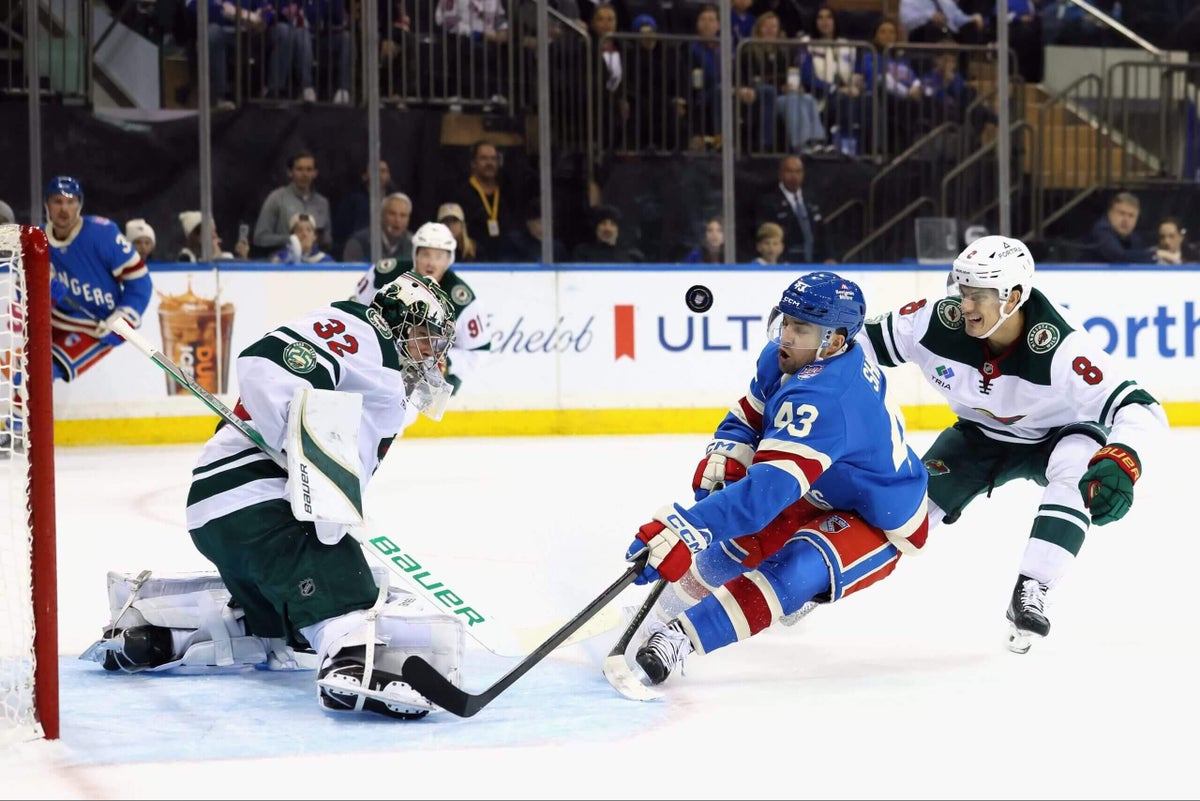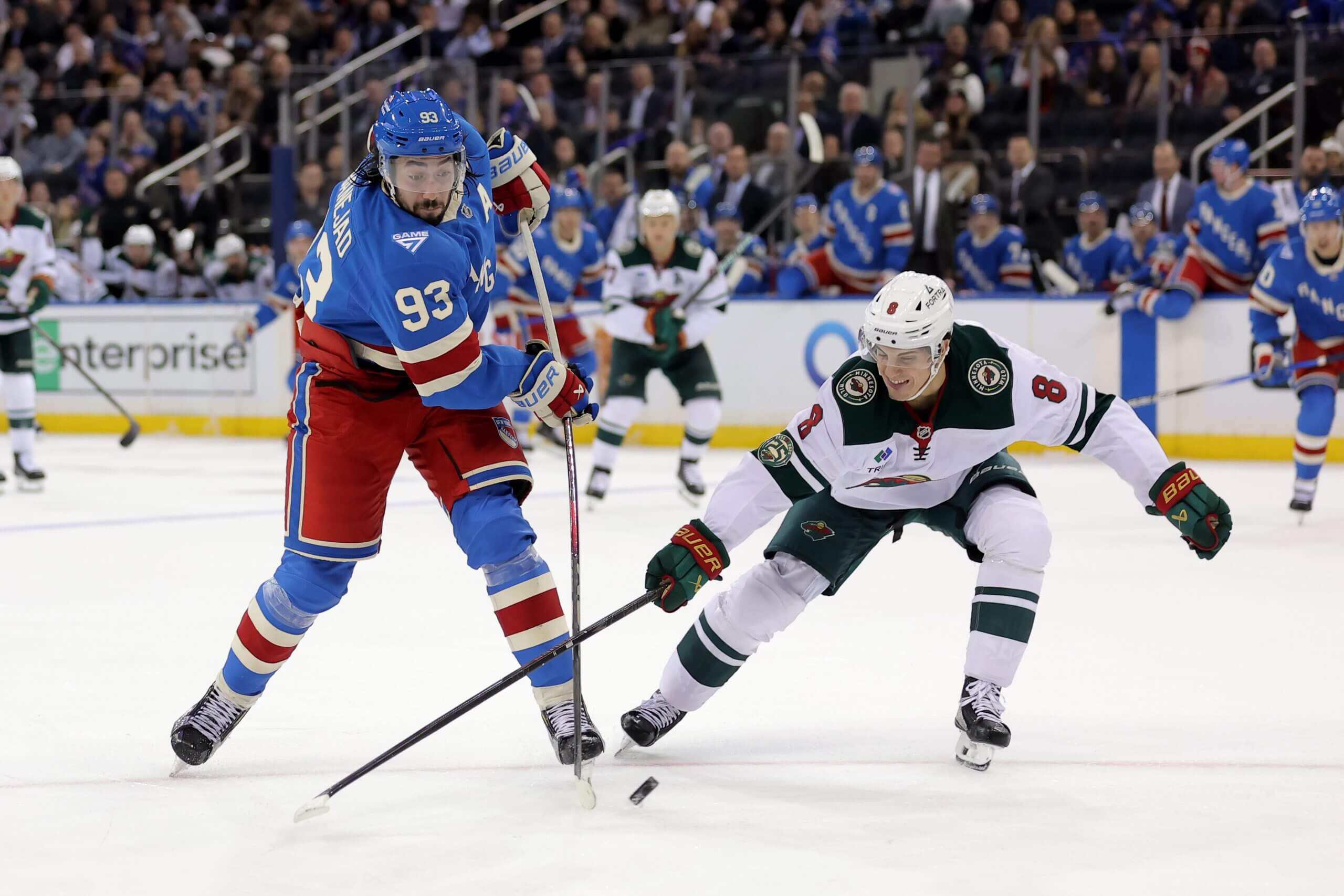NEW YORK — Mika Zibanejad is regarded as one of the New York Rangers’ more cerebral players, one who rarely lets his emotions get the better of him. But after Monday’s 3-1 loss to the Minnesota Wild at Madison Square Garden, his exasperation over his team’s offensive struggles began to show.
“What else should I do more?” he interjected during a question about the Rangers’ failing to convert scoring chances into goals. “I have to score. Yes, I understand that, but I’m getting to the chance. I’d be more worried if we didn’t get any chances.
“It’s frustrating for us. It’s frustrating for me. How many looks did we have? Not just this game, just overall. I honestly don’t know what else to do.”
The night began with promise, with Zibanejad hustling to track a puck along the goal line and making a quick feed to Artemi Panarin for a long-awaited goal just 57 seconds into the contest. That ended the Rangers’ MSG scoring drought at 180:57, leaving them 6:22 shy of tying the 1928-29 Pittsburgh Pirates for the NHL’s longest home-ice drought to begin a season.
Mika with the feed + Bread buries it. pic.twitter.com/rVIH63MrnN
— New York Rangers (@NYRangers) October 20, 2025
The problem is they went the next 59:03 without finding the back of the net again, with the new cold streak dropping their record to 0-4 at home.
“It’s disappointing for that,” said defenseman Adam Fox, who led all skaters with 25:34 time on ice. “It’s disappointing because we’re winless on home (ice). You want to take advantage of that. You have a crowd behind you. You score. You want to get some momentum and build off that, and we didn’t do a good job of that.”
The rallying cry after previous losses has been that they’re generating quality looks, therefore the goals will eventually come. They’ve had a point, with the Rangers (3-4-1) out-chancing opponents in each of their previous five games, according to Clear Sight Analytics. But they’ve now lost four of five because they simply aren’t burying enough of them.
They’ve scored one goal through 240 minutes at MSG while averaging only two goals per game through their first eight contests in all.
“We’ve got to work on our offense,” Panarin said. “Our defense hasn’t been bad, but you can’t win with one goal.”
Monday had a slightly different feel. The Wild held a 15-13 edge in high-danger scoring chances, according to Natural Stat Trick, but their advantage in possession time and stretches in which they controlled play felt more lopsided. After Panarin’s goal, Minnesota registered 12 of the next 13 shots — including the tying goal from Jonas Brodin — to take the air out of the Garden crowd.
“It comes down to puck battles,” Rangers coach Mike Sullivan said. “They were quicker to pucks. They were harder on pucks. It’s hard to have success when you’re on the wrong side of those puck battles. A lot of times it’s going to decide who has possession. It’s going to decide where the game is going to be played territorially.”
“Other than the first two shifts, I thought they outplayed us the whole (first) period,” captain J.T. Miller said. “They deserved to win tonight. They played a more complete game than we did.”
The Wild indeed looked like the more desperate team, and maybe they were. They entered having lost three straight, but this was also their third road game in the last four days. Given the context of the Rangers’ home-ice scoring drought and losing streak, they had every reason to match that intensity.
The larger problem may be that they lack scoring depth. Panarin and Zibanejad have combined for 8 points in the past two games, and Miller was battling his way to the net throughout Monday’s contest and led the team with six shots. But outside of those three, where are the goals coming from?
Fox is the only New York defensemen who can be expected to regularly produce points, and the rest of the forward group is severely lacking firepower in the absence of Vincent Trocheck, who is out until at least Nov. 1 with an upper-body injury.
During their run of two Eastern Conference Finals appearances in three years from 2022 to 2024, the Rangers had considerable skill in their bottom six. But Filip Chytil and Kaapo Kakko are playing in different cities now, and Will Cuylle and Alexis Lafrenière have been elevated to the top six out of necessity. Neither has been very productive in those critical roles, combining for two goals and only one assist through eight games. And while the Adam Edström–Sam Carrick–Matt Rempe line has been a nice story to begin the season, it can’t be relied on as a consistent source of offense.
The Rangers need others to step up, but it feels like there’s a dearth of options. Soon, they may have to look to prospects such as Brett Berard, Scott Morrow, Brennan Othmann and Gabe Perreault. But it’s also unfair to expect a few inexperienced kids to be saviors.
The positive is that the Rangers have made significant defensive strides under Sullivan, which was rightfully a top priority entering the season. And there have certainly been games when they deserved better based on the quality of their scoring chances. But finishing is a skill that can be measured by only one stat — goals — and the pressure to carry that burden already seems to be weighing on the few being asked to bear it.
“You have to capitalize on them at some point,” Fox said. “We can’t keep having these tight games that we’re on the wrong side of.”
More observations
• The Rangers’ best push came at the beginning of the third period. They registered five of the first six shots on goal, including a Zibanejad chance from the slot that Minnesota goalie Filip Gustavsson barely got a piece of with his right shoulder. Miller also had a prime redirect attempt that missed high. But the most devastating moment may have come later in the period, shortly after Danila Yurov gave the Wild a 2-1 lead with 11:44 to play. Panarin found Zibanejad in the low slot once again, but Gustavsson gloved the close-range shot to fuel the frustration.
Mika Zibanejad takes a shot against Wild defenseman Zeev Buium during the second period. (Brad Penner / Imagn Images)
“I have to score on that one,” Zibanejad said. “Simple. Do I want to? Yeah, but I’m not scoring on that chance. There’s a couple others I missed. I have to do a better job of bearing down on the chances I’m getting.”
• Carson Soucy returned to the lineup after missing the previous four games with an upper-body injury. It was sustained Oct. 11 in Pittsburgh when he flew headfirst into the boards while attempting to check Penguins forward Rickard Rakell, but the 31-year-old defenseman said “it looked worse than it was.”
“It also didn’t feel great at the time,” he added, “(but I was a) little more just shocked when it happened. I was obviously a little stiff the next couple days, but I’ve been feeling good.”
Soucy was limited to 10:20 TOI, including only four fourth-period shifts.
• Soucy’s return meant another defenseman had to come out of the lineup, with Sullivan opting to scratch Urho Vaakanainen for the first time this season. The 26-year-old Finn has produced solid on-ice metrics, with a 55.64 percent expected goals-for rate, according to Natural Stat Trick. But he has gotten beat on a few noticeable occasions and has struggled to move pucks effectively, with some glaring turnovers mixed in.
Vaakanainen has been outplayed by rookie Matthew Robertson, who lost his prospect shine after years of toiling in the AHL but got his first real opportunity when Soucy went down, and he seized it. The 24-year-old scored his first NHL goal in Saturday’s 4-3 win over the Montreal Canadiens and had posted a 61.63 percent xGF entering Monday, which ranked first among the team’s defensemen. His play merited a longer stay in the lineup, and Sullivan rewarded it. Robertson logged 20:19 TOI with five shot attempts (one on goal), two hits and two giveaways.
• Robertson joined Noah Laba as one of two rookies in the Rangers’ lineup, with the latter enduring a scary moment at the 7:01 mark of the second period. Vinnie Hinostroza wound up for a big slap shot, and when Laba went to block the attempt, the puck ricocheted off his own stick and hit him directly in the face. The 22-year-old center immediately hunched over in pain and left a trail of blood on his way to the dressing room, but he returned to the bench before the end of the period wearing a full face shield and miraculously finished the game. Hockey players, man.
“Any time a player gets hit in the face like that, it’s really scary,” Sullivan said. “Fortunately, it wasn’t too serious. He got stitched up. The fact that he came back, I think, just speaks to his competitiveness and his toughness.”


